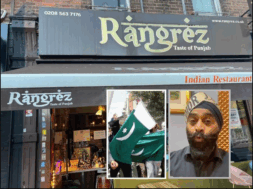
Manas Dasgupta
NEW DELHI, Oct 22: The Supreme Court on Tuesday reserved its verdict on petitions challenging the Allahabad High Court order of March, 2024, declaring the 2004 Uttar Pradesh law on madrasas as unconstitutional for being violative of the principle of secularism and asking the state government to accommodate the madrasa students in the formal schooling system.
A Bench comprising Chief Justice of India (CJI) D. Y. Chandrachud and Justices J. B. Pardiwala and Manoj Misra heard a battery of lawyers on behalf of eight petitioners besides Additional Solicitor General K.M. Natraj for the UP government for almost two days before reserving the verdict.
The Uttar Pradesh Board of Madarsa Education Act, 2004, which was declared unconstitutional by the Allahabad High Court, regulates the operation of madrasas in the state and was framed to ensure quality education, while adhering to constitutional principles, in such institutions.
Commencing the final arguments on the pleas against the verdict, the Bench, on Monday heard senior lawyers including Abhishek Manu Singhvi, Salman Khurshid and Menaka Guruswamy for the petitioners. On Tuesday, the top court also heard senior advocates including Mukul Rohatgi, P. Chidambaram and Guru Krishna Kumar for various litigants.
On March 22, the Allahabad High Court had declared the Act as “unconstitutional” and violative of the principle of secularism, and had asked the State government to accommodate madrasa students in the formal education stream. On April 5, the CJI-led Bench had provided a breather to about 17 lakh madrasa students by staying the verdict of the High Court scrapping the 2004 act.
The top court heard about eight petitions, including the lead one filed by Anjum Kadari against the High Court verdict. The top court on Monday had made a point that laws which regulate institutions run by religious or linguistic minorities, for that very reason alone, cannot be accused of breaching secularism. “A law per se regulating an institution belonging to a particular community does not ipso facto [by the fact itself] offend the principle of secularism,” Chief Justice Chandrachud had made oral observation.
The 2004 Act regulated madrasas in the State. The High Court had concluded that the law violated the principles of secularism. It had ordered the transfer of their students, especially those in recognised madrasas, to regular schools. Petitioners claimed in the top court that the verdict had affected the lives of nearly 17 lakh students spread across 16,000 madrasas in Uttar Pradesh.
The CJI referred to another Act in the same context, The Hindu Religious Endowments and Charitable Institutions Act, which provided for the “proper administration of religious institutions… and is there in all States from Maharashtra to Tamil Nadu.”
The Chief Justice said a State had a right to legislate to improve the excellence of a government-aided minority-run institution. It is within a State’s vital interest. These are young children who come to madrasas. They need a broad-based education… They should learn the essentials of subjects required to lead a proper life, so they become worthy citizens,” the CJI observed.
The Chief Justice pointed out that Article 30 enabled minorities to establish and administer their institutions which were not entirely confined to teaching of their religion. “A Zoroastrian or Buddhist institution can teach medicine or engineering. There is no compulsion that a Buddhist institution should teach only Buddhism,” the CJI remarked.
Petitioners argued that the High Court had found that madrasas violated Article 28 of the Constitution, which prohibited “religious instruction” in educational institutions fully funded by the State. They argued that academics in madrasas was a “mixture of science, mathematics, etc with certain portions of religious education and not religious instruction.”
The Bench however questioned whether a certificate from a madrasa would be valid for a student to go outside its system for post-graduation course. Senior advocate Ms Guruswamy said the solicitations to give madrasas university status began in 2002, but there has been no headway.
Meanwhile, another bench of the Supreme Court on Tuesday cautioned the UP’s Yogi Adityanath government against any bulldozer action in riot-hit Bahraich town ignoring the top court’s earlier order. The court said it was the state government’s “choice” if it wanted to risk violating the top court’s directions. The court, however, noted that its orders in the ‘bulldozer justice’ case specify that it would not intervene if the structures facing demolition were illegal.
The bench of Justice BR Gavai and Justice KV Viswanathan has asked the Uttar Pradesh government not to take any action before the next hearing on Wednesday. Appearing for the petitioners, Senior Advocate CU Singh told the bench that local authorities issued demolition notices after the October 13 violence — which claimed one life — and asked them to respond within three days.
“Applicant No.1’s father and brothers surrendered… notices purportedly issued on 17 Oct, but pasted on 18th evening… we sought hearing on Sunday, but that did not happen. Some have approached HC,” Mr Singh said.
Earlier, the Allahabad High Court extended to 15 days the deadline to file replies to the demolition notices and directed the state authorities to decide after considering the responses. Additional Solicitor General KM Nataraj, appearing for the UP government, assured the court that no action would be taken till tomorrow.
“If they (UP authorities) want to take the risk of flouting our order, it’s their choice,” Justice Gavai said on Tuesday. Justice Viswanathan added that the high court had given 15 days to file replies to the demolition notices. Mr Singh, however, said the petitioners have not been granted any protection.
The Supreme Court is currently hearing a bunch of petitions against ‘bulldozer justice’ – a term used to refer to the practice of razing the property of individuals accused in criminal cases. The trend has caught on in several states, Uttar Pradesh among them. The court has clarified that being accused of a crime cannot be the basis for the demolition of property and only violation of civic rules may attract such action. The court has also paused demolitions carried out without its permission.
In Bahraich, an altercation had broken out on October 13 in Maharajganj when a group of people objected to loud music near a mosque during a procession for Durga Puja idol immersion. This snowballed into arson and vandalism in the area, forcing the local administration to snap Internet connectivity. Ram Gopal Mishra, 22, was shot dead during the clash. A video that circulated after the clash showed Mishra removing a green flag from a rooftop and replacing it with a saffron flag.
Police have arrested five persons suspected to be involved in Mishra’s death — Mohammad Faheen, Mohammad Sarfaraz, Abdul Hameed, Mohammad Taleem alias Sabloo, and Mohammad Afzal. Mohammad Taleem and Mohammad Sarfaraz were arrested after they suffered gunshots in an encounter with Uttar Pradesh police. Police said the accused were trying to cross into Nepal when they were caught.
A total of 104 people have been arrested in connection with the violence and 23 establishments have been served demolition notices. Among those who were served notices is Hameed, one of the accused in the killing. Authorities, however, claim the notices were issued as part of a routine anti-encroachment drive. The notices have sparked panic among local residents as shopkeepers were seen vacating their premises.














